
2024 SEO and Content Trends: Top Predictions from 27 Industry Experts
In 2023, SEO and content marketing evolved, thanks to the introduction of AI content and numerous Google updates to improve the quality of SERP results.
As we enter 2024, we expect deeper integration of AI into SEO and content creation, heightened emphasis on expert-written content, and further advancement from Google, like the Search Generative Experience (SGE).
This article prepares you for the coming changes with predictions from 27 SEO and content experts, plus strategies to adapt to the rapidly evolving digital landscape.
Google SGE Predictions
1. New Google updates and features to reward expert content

Aleyda Solis — International SEO Consultant & Founder at Orainti
In 2024, I predict that Google will roll out several key features and updates. Firstly, we'll likely see updates to boost content created by humans and experts. This shift is a response to the growing use of AI-generated content. Also, Google might introduce new tools encouraging user-generated content (UGC) and social interactions. This move could attempt to reclaim the audience drawn to platforms like TikTok.
Furthermore, I predict that Google will focus more on e-commerce. They might unveil features through SGE or other means, positioning as a formidable competitor to Amazon. Finally, the updated SGE experience will likely change how we optimize content and engage with customers throughout their search journey.
It will be a very fun year!
More content from Aleyda Solis:
The Ultimate Low-Hanging Fruit Strategy — Whiteboard Friday
SEO Auditing Success — Whiteboard Friday
2. A new SEO landscape shaped by Google SGE and AI innovations
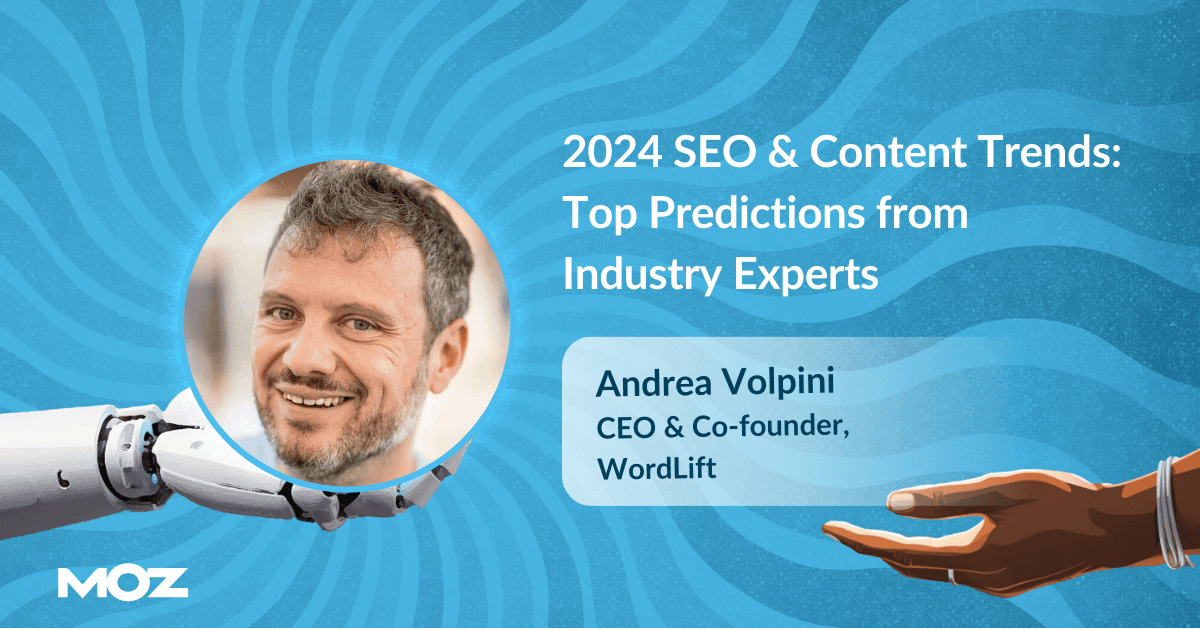
Andrea Volpini — CEO and Co-founder of WordLift
The introduction of Google's SGE marks another critical shift in the evolution of search, indicating that many users will get what they need directly from the search results page. This change could lead to decreased traffic for traditional informational websites.
Simultaneously, Google is reshaping e-commerce by enriching product information and streamlining the connection between online and in-store shopping, positioning itself as a fierce competitor to Amazon.
The SEO landscape is adapting to these changes with an emphasis on AI. Autonomous agents and ontologies will define new standards, where SEO strategies must integrate detailed knowledge frameworks to distinguish brands in a crowded market.
With the rise of AI-generated content and authorship, SEO experts must develop innovative tactics to ensure that content resonates and engages meaningfully and distinctly.
3. The metrics we measure will change with the rise of Google SGE
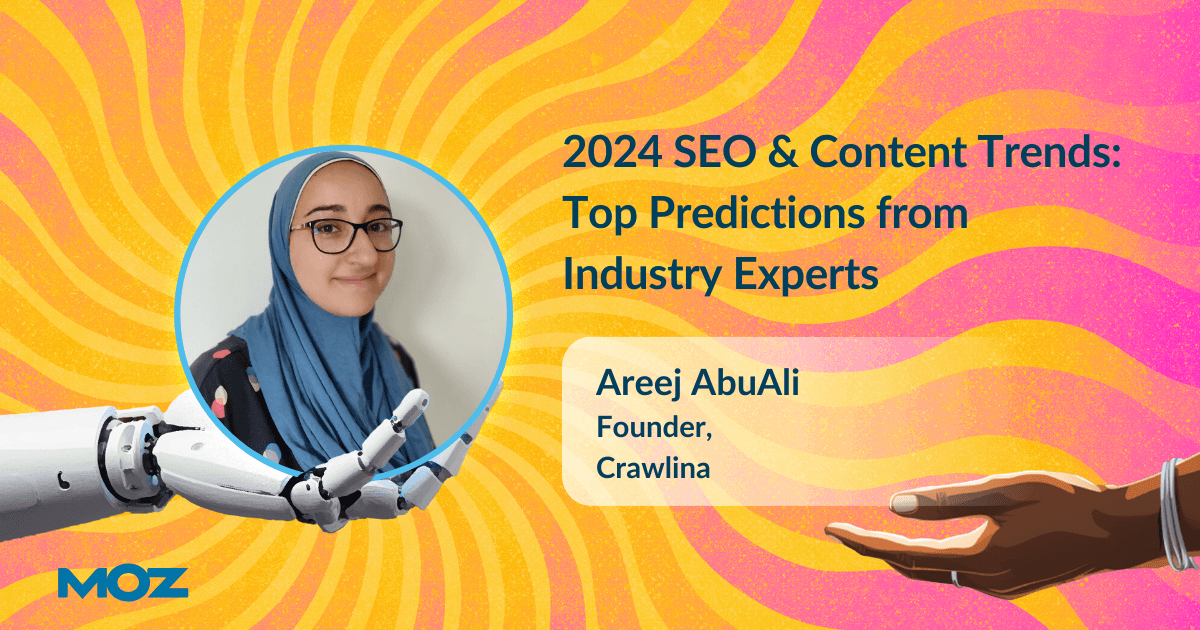
Areej AbuAli — Founder at Crawlina
As SGE becomes more integrated within the SERPs, users will likely spend more time on Google than on individual consumer websites. This change will significantly impact how we measure organic SEO success.
The focus of SEO metrics will pivot towards conversion rates, lead generation, and overall brand visibility, as opposed to traditional metrics like rankings and click-through rates.
This shift recognizes the evolving nature of user interactions with search engines. Additionally, the SEO community will continue experimenting and adapting to how search engines incorporate generative AI into user experience, marking a period of learning and adaptation.
More content from Areej AbuAli
Site Architecture Optimization for Seasonality — Whiteboard Friday
4. Limited impact of SGE on search
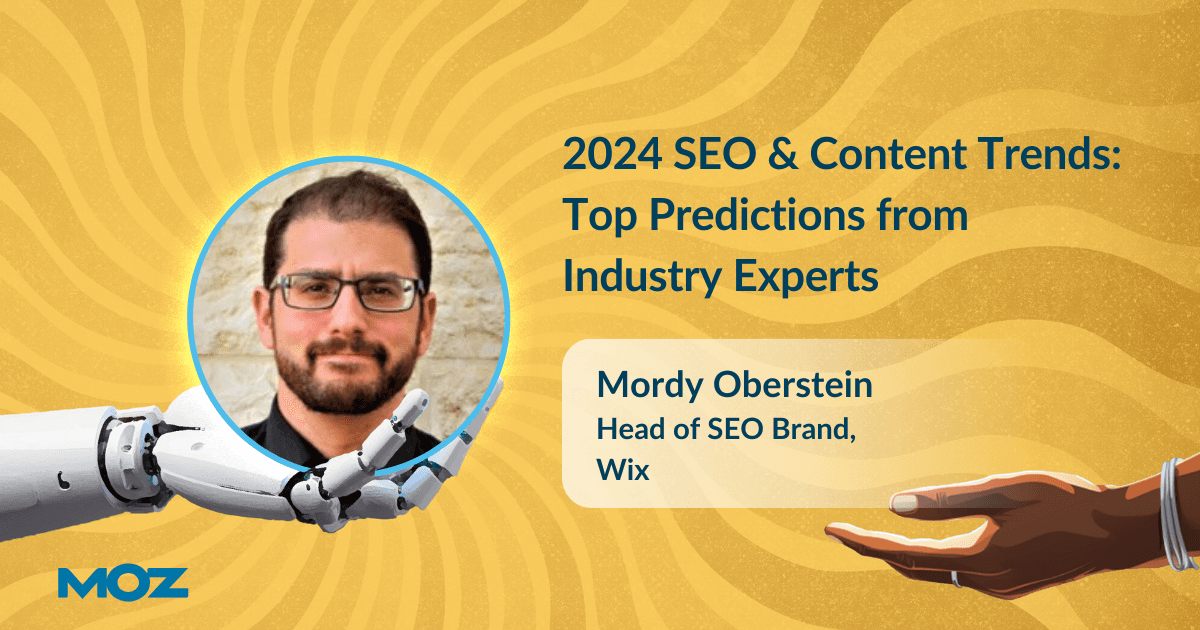
Mordy Oberstein — Head of SEO Brand at Wix
The emergence of Google's SGE might not be the disruptor some anticipate. While SGE may find its user base, its impact on the search paradigm could be limited. The case in point is Bing's exclusive AI chat experience in search, which didn't significantly shift user preferences towards Bing.
Human nature tends to gravitate towards direct sources of information. People generally prefer to engage with actual web pages, a behavior unlikely to be drastically altered by SGE.
Instead of focusing solely on the potential effects of SGE on web traffic, it might be more prudent to pay attention to advancements in Google's algorithm itself. These improvements could have more substantial implications for SEO and web traffic than the introduction of SGE.
More content from Mordy Oberstein
What I Found Experimenting with Google Discover for Two Months
SERP predictions
5. A shift from Google-dominated search to alternative platforms
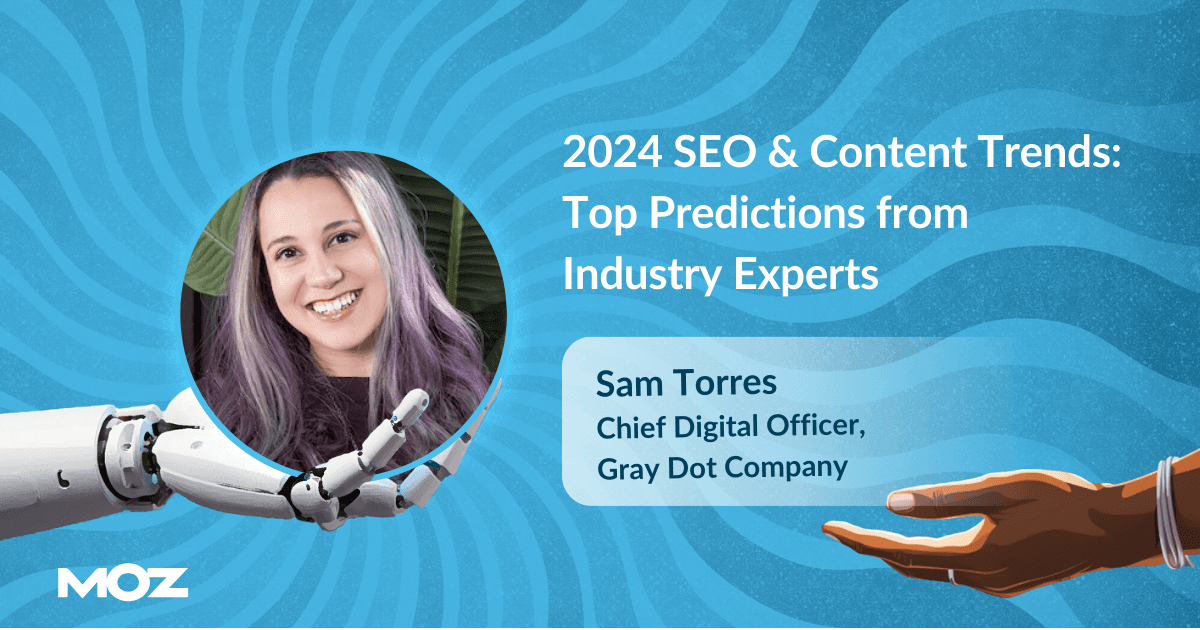
Sam Torres — Chief Digital Officer at Gray Dot Company
The current focus on Google in the search industry overlooks a wealth of valuable data. In reality, search is bigger than Google. As users increasingly turn to alternative platforms like TikTok, YouTube, Pinterest, and even Reddit for answers and inspiration, the scope of search marketing is set to expand.
This shift will require marketers and tool suites to adapt, leveraging data from these diverse, non-traditional sources to stay relevant in SEO. Alongside this change, SEO professionals must redefine their key performance indicators (KPIs). As driving organic traffic becomes more challenging, new measures of success will emerge.
Brands must identify the right mix of search marketing platforms aligned with their specific business goals. Hence, KPIs such as share of voice, revenue, and profitability will become crucial in evaluating successful outcomes.
More content from Sam Torres
Transitioning to GA4: Is this the Right Analytics Move for Your Team?
6. Users might look for answers beyond traditional search engines

Lauren Fox — Strategic Marketing VP
In 2024, Google’s SGE will make it increasingly harder to get organic clicks as more users adopt this feature into their search process.
Moreover, if not controlled, spammy, low-quality, AI-generated content could make it increasingly difficult for users to find high-quality, trustworthy information through search engines. As a result, users might start looking for answers on platforms like TikTok or Reddit or using more specific, long-tail search terms and phrases.
Crowd-sourced information such as reviews and personal experiences will be crucial to effective content and SEO in 2024.
Also, the fundamental principle that people trust people will continue to drive searcher behavior in 2024 and beyond.
My advice is to show searchers why they should trust your brand and its content. Continue to provide the best answers to your audience’s questions. Ensure you communicate your expertise and opinions in your niche to build credibility and trust with your audience.
More content from Lauren Fox
Why and How to Add Pillar Pages to Your Content Strategy
The ROI of Re-Optimizing Content — Case Study
7. How we search for information is changing
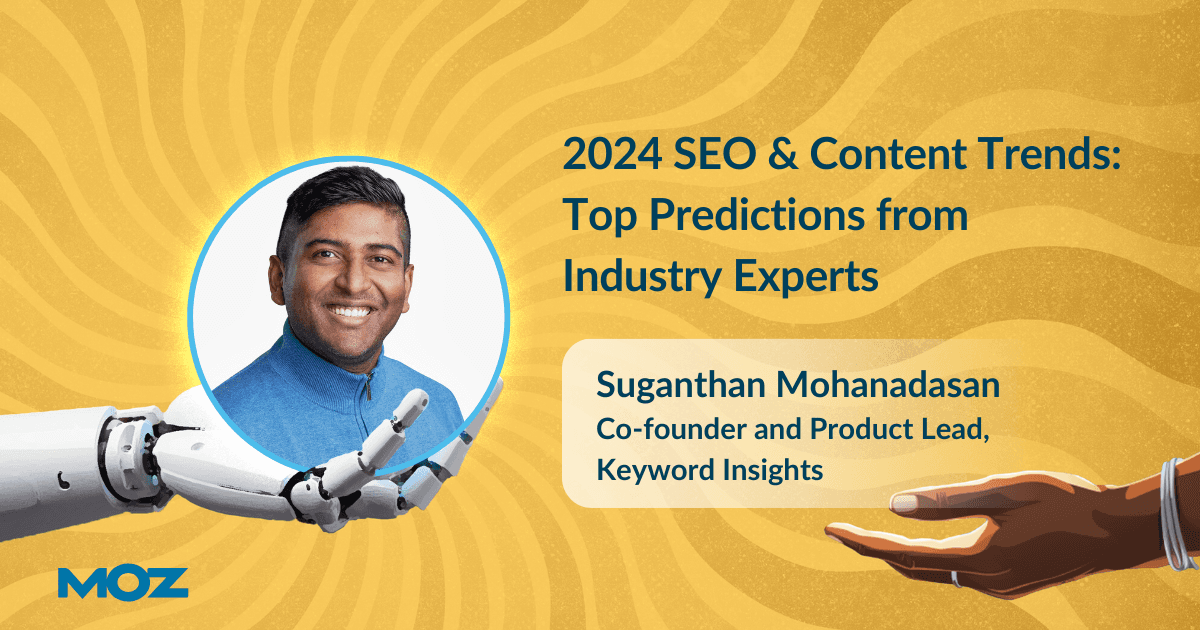
Suganthan Mohanadasan — Co-founder and Product Lead at Keyword Insights
As people's attention spans continue to decrease, how we search for information changes. Instead of relying solely on Google, we're seeing a shift towards shorter, more easily digestible content on various platforms.
Social media platforms, notably TikTok, YouTube Shorts, and Pinterest are rapidly becoming key destinations for people to search for and discover information.
Adapting and repurposing content to suit the unique formats of these platforms is essential. By doing so, we can effectively engage with our audience, meeting them where they are in their journey.
8. A shift towards content that shapes culture instead of the SERPs
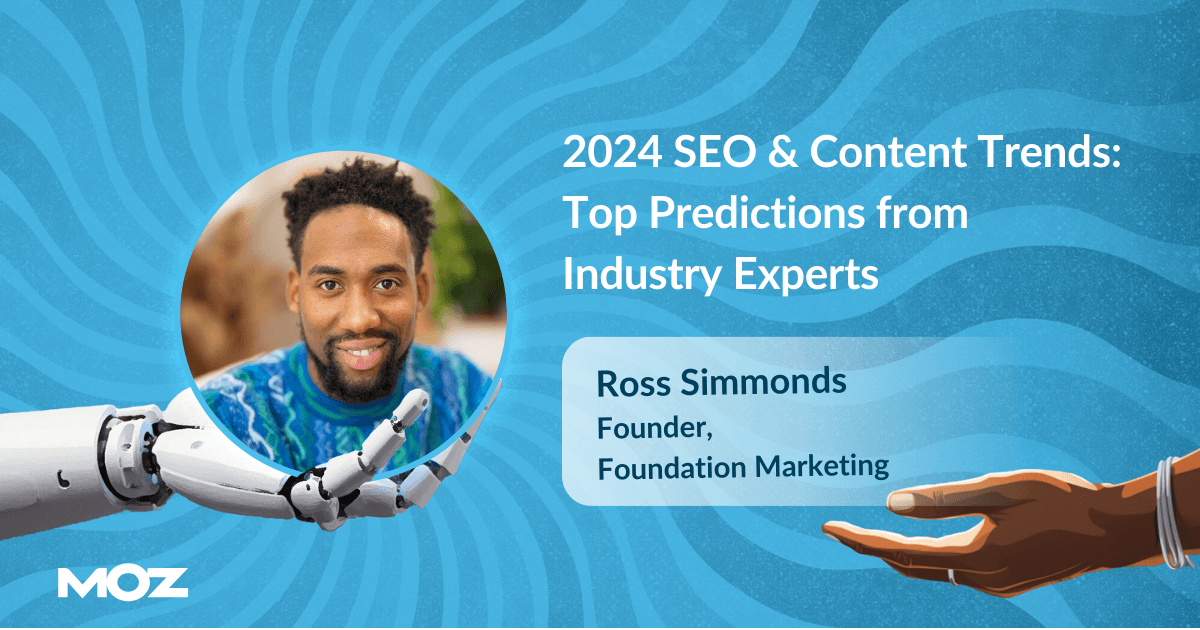
Ross Simmonds — Founder of Foundation Marketing
In 2024, SEOs and content marketers will revert to some of the original marketing principles as brand metrics and signals play an essential role in SERP ranking and capturing traffic from content marketing.
Tactics like generating backlinks or keyword-optimized headers won't suffice. Instead, the focus will shift to the 'marketing' aspect of 'content marketing.' Brands need to stand out from AI-driven content by committing to content excellence.
This means creating assets rich in insight, storytelling and incorporating multimedia elements where possible. The future of the SERP will rest on our ability as an industry to step up and deliver content that shapes culture instead of content that shapes the SERP.
9. A broader online presence will be critical for digital success

Amanda Jordan, SEO Strategy Director at Rickety Roo
In 2024, SEO focus will likely shift from merely ranking a website on search engines to establishing a broad online presence. This holistic approach means a business’s visibility and reputation across various digital platforms will become crucial for SEO success. It will go beyond having links on external websites to becoming a relevant entity.
The winners will be those who reach their audience with value-driven content, not just ads. Creating a unique digital ecosystem enables a business to be an autonomous entity. As such, we need to redefine SEO to truly embody 'search engine optimization' in its entirety rather than being confined to just website optimization.
10. Niche keywords and manual research will save the day
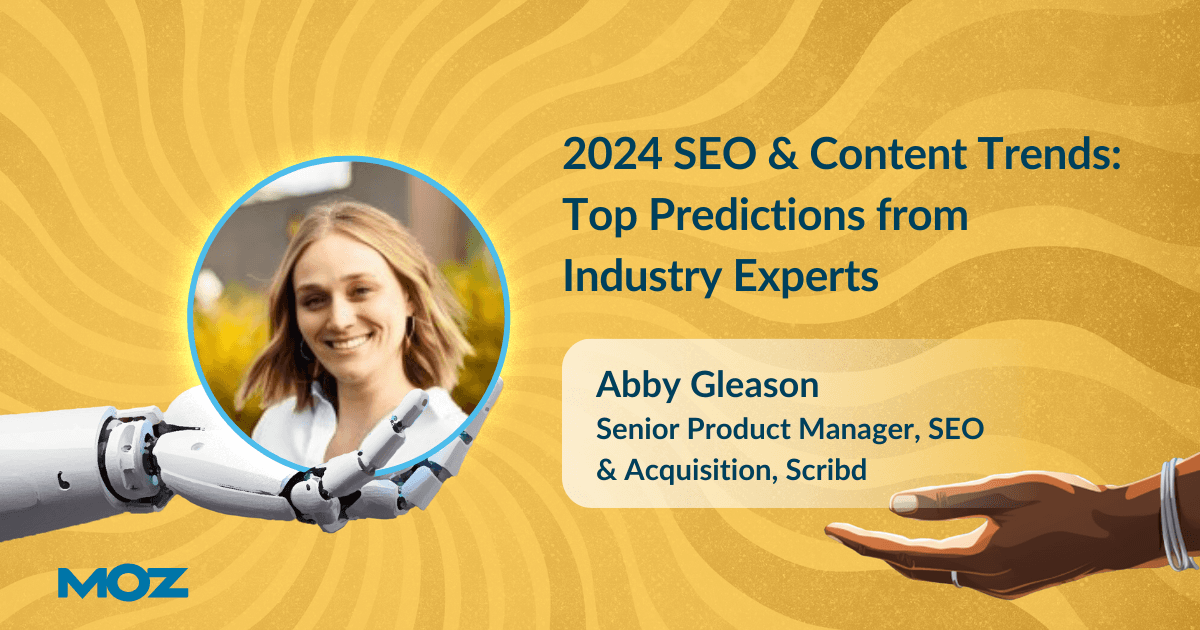
Abby Gleason, Senior Product Manager, SEO & Acquisition at Scribd
In 2024, targeting trending or zero-volume keywords will be critical. The SERPs for evergreen content are highly competitive, making niche questions from sources like People Also Ask, Reddit, and TikTok particularly valuable.
In an AI-dominated era, content marketers who engage in hands-on research for their topics will stand out. This manual approach will lead to more traffic and better engagement as it taps into the specific, often unaddressed interests of audiences.
More content from Abby Gleason
E-E-A-T and thought leadership predictions
11. Thought leadership will separate the wheat from the chaff
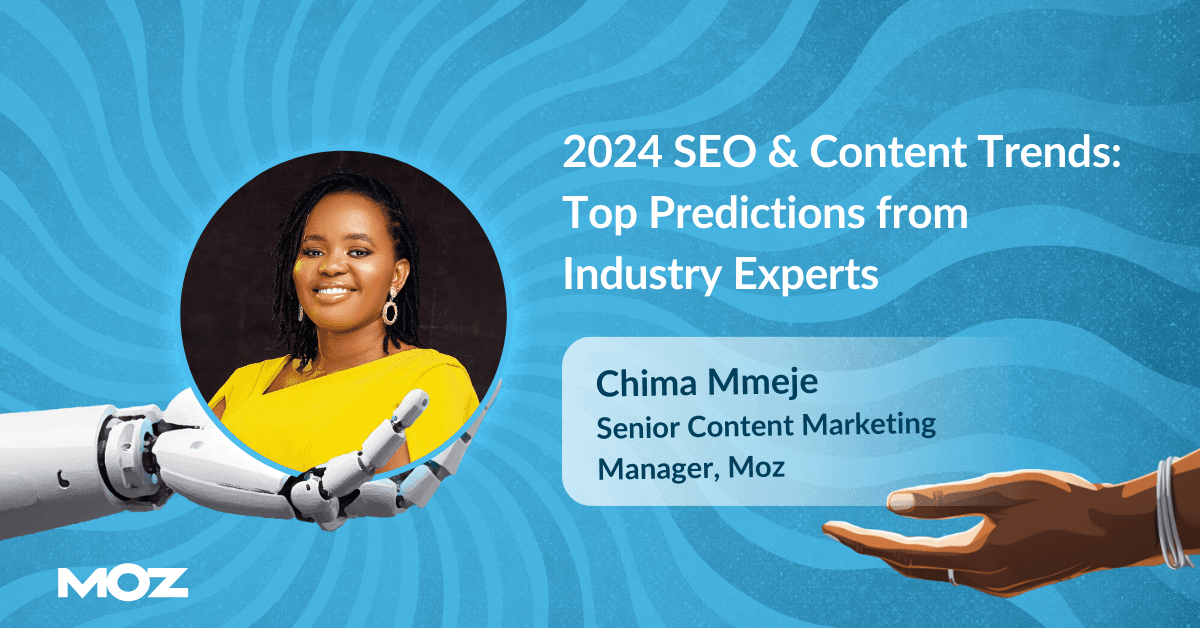
Chima Mmeje — Senior Content Marketing Manager at Moz
In 2024, we'll inevitably see more low-quality AI content on the web, leading to apprehension and distrust among readers. In response, people will naturally gravitate towards thought leaders for reliable information.
Authentic and original insights from thought leaders enhance your brand's reputation and credibility, key factors in Google's content quality assessment.
Six ways brands can position as thought leaders to improve E-E-A-T (experience, expertise, authority, and trust):
Platform internal experts in your company and encourage them to publish content on your blog.
Collaborate with industry experts to enhance the authoritative value of your content.
Regularly publish content that showcases your in-depth knowledge and experience in a particular topic.
Use webinars, podcasts, and social media to engage with your audience and build trust.
Produce and share original research, studies, and data-driven insights that AI can’t replicate.
Focus on quality over quantity to build a reputation as a trusted source in your industry.
12. Experience will weigh heavily on ranking signals in 2024
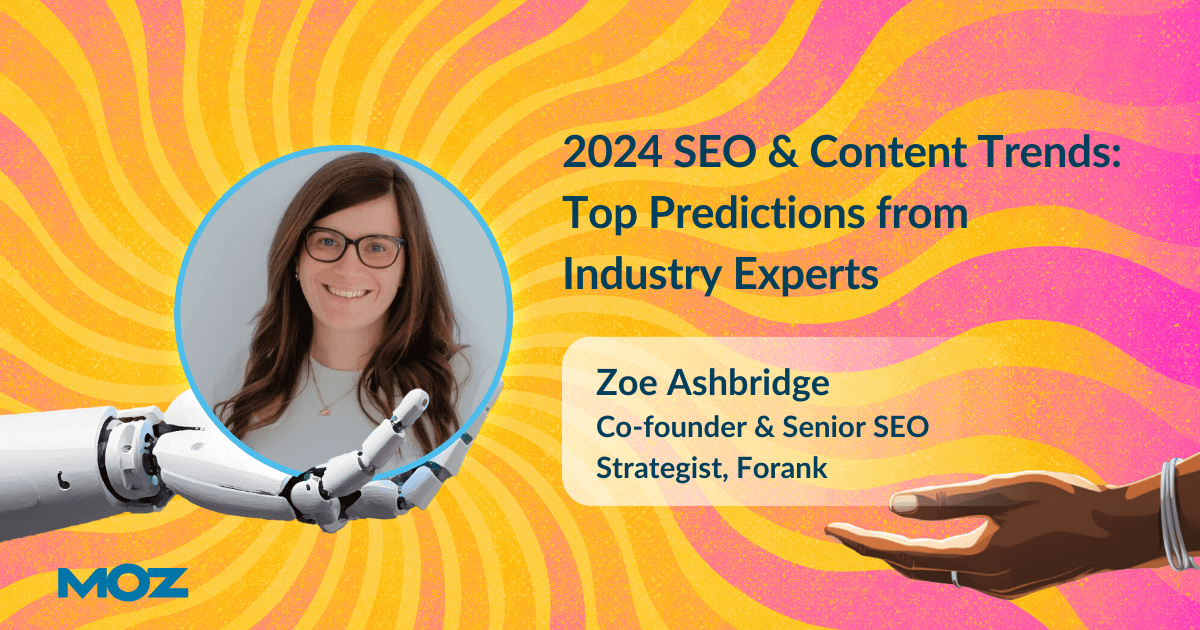
Zoe Ashbridge — Co-Founder & Senior SEO Strategist at Forank
It’s no coincidence that Google added the extra ‘E’ for experience in E-E-A-T in December 2022, just 15 days after ChatGPT launched.
Google wants its search results pages to display the most trustworthy sources, and you can expect the experience to weigh heavily into ranking signals in 2024.
To effectively showcase your experience, consider these strategies:
Implement schema markup to convey your experience to Google, including qualifications and educational background.
Use the ‘SameAs’ schema to link to your social profiles and entities across the web.
Write content in the first person to share personal stories and insights.
Highlight your expertise through case studies and use cases, demonstrating your capabilities in real-world scenarios.
Your lived experience is the best way to separate yourself from competitors, and it’s one thing that AI can’t do.
More content from Zoe Ashbridge:
How to Use Keyword Clustering to Seamlessly Optimize Your SEO Content
How to Earn Topical Authority in 2023 and Beyond
13. First-hand experiences and thought leadership will be pivotal for SEO success

Kerry Campion — Founder & SEO Copywriter at God Save The SERP
With the onset of AI-generated content, users are becoming more intentional with the type of content they trust and consume. Pair that with Google’s new E-E-A-T guidelines and the Helpful Content Update (HCU); I envision a 2024 that sees the smartest brands invest more in partnerships with known thought leaders in their industry to boost their E-E-A-T signals.
Additionally, the trend of producing extensive 'skyscraper' content might see a decline in effectiveness in SERPs. The focus is now shifting towards content that offers first-hand experiences and originality.
Brands will likely adopt a more product-led SEO approach, incorporating case studies and unique customer stories into their content. This strategy ensures originality and makes it difficult for competitors to replicate content, as it is deeply rooted in individual product experiences and narratives.
14. Google's focus on first-hand experience to outshine AI
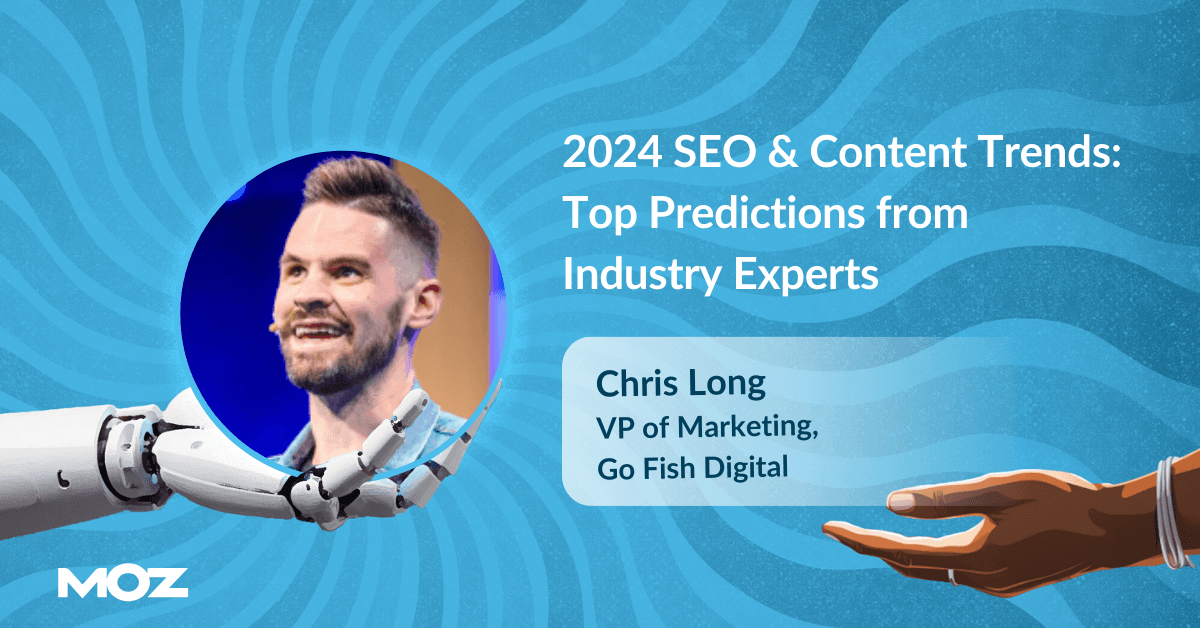
Chris Long —VP of Marketing at Go Fish Digital
I predict Google will elevate content based on "first-hand experience" in its search results. This initiative will likely encompass a range of formats, including forum discussions, videos, and possibly social media content.
The driving force behind this strategy is distinguishing Google's search results from the responses generated by AI platforms like ChatGPT. This move underscores the increasing value of content that originates from genuine human insights and experiences.
More content from Chris Long
Five Ways SEOs Can Use ChatGPT — Whiteboard Friday
15. More AI integration in workflows and emphasis on E-E-A-T-aligned content
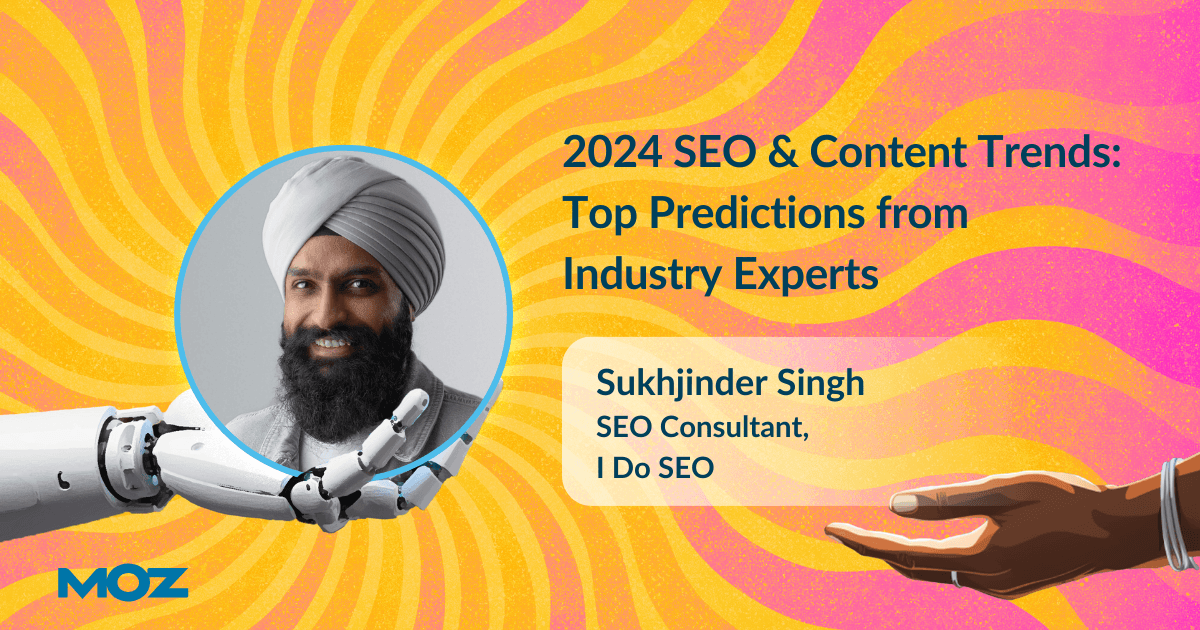
Sukhjinder Singh — SEO Consultant at I Do SEO
My predictions for the upcoming year focus on two key areas: audience-targeted content and enhanced AI integration in workflows. The introduction of Google’s ‘Helpful Content System’ and the new “Experience” element in its E-E-A-T guidelines reinforces the importance of creating content that resonates with humans.
This isn’t a new concept for seasoned SEOs; we've known the significance of user-focused content since the early days of Google's Webmaster guidelines. However, the expanding resources in Google Search Central, official algorithm updates, and communications from figures like Danny Sullivan and John Mueller are invaluable for guiding newer consultants in this direction.
Regarding AI, sophisticated prompts for internal and client-related tasks are becoming more common. With Google loosening its stance on ‘machine learning’ guidance, AI tools are becoming more acceptable as long as the output remains original, helpful, and aligns with the E-E-A-T framework.
16. Prioritizing subject matter expertise in SERPs
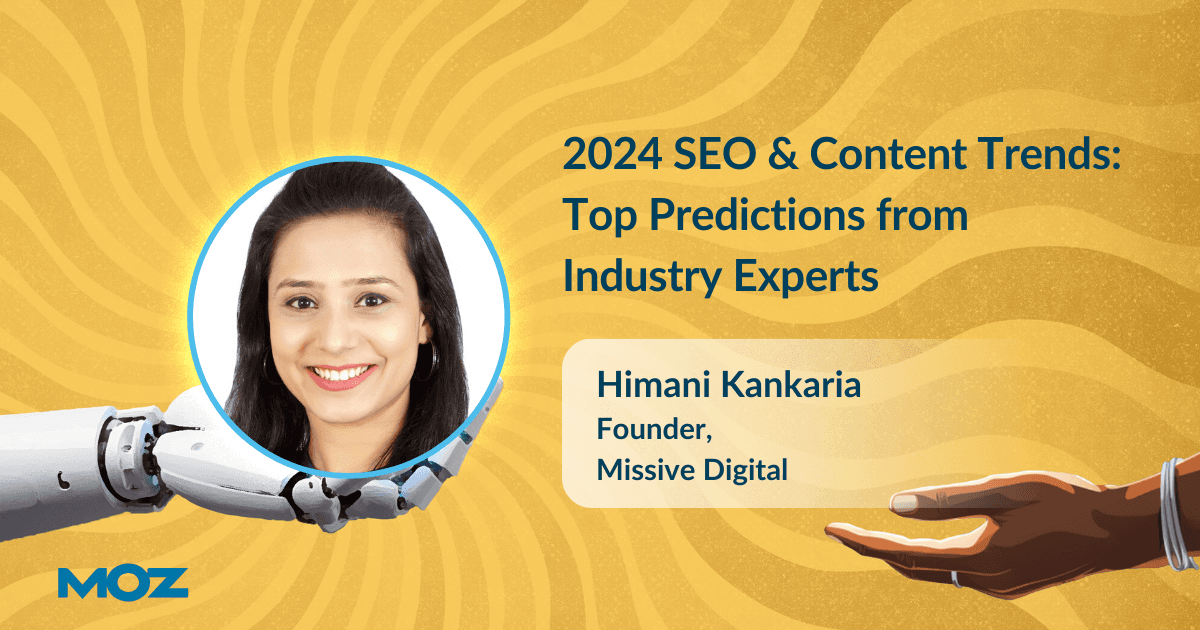
Himani Kankaria — Founder, Missive Digital
In 2024, the synergy between SEO and content will emphasize three key areas: exceptionally helpful content, a focus on visual elements, and the expertise behind content creation.
Gone are the days when speed trumped quality in content production, especially with AI-generated material. Now, SEO and content teams must collaborate with subject matter experts (SMEs) to infuse genuine value into every piece of content. This approach aligns with the lessons learned from Google's Helpful Content Update (HCU) and its impact on websites.
Moreover, there will be a heightened focus on contextual visuals for enriching content and achieving better visibility in Search Engine Results Pages (SERPs). Collaborating with social media teams to utilize these visuals can enhance direct SERP visibility and expedite content indexing.
Finally, 2024 will witness a greater emphasis on establishing the credibility of authors through thought leadership. Search engines must recognize that your content is supported by credible industry figures, thereby ensuring its usefulness and relevance.
17. Linked author bios and unique insights will elevate content authority

Joshua George — Founder at ClickSlice
In response to the AI content surge, Google will likely emphasize E-E-A-T and links to authoritative content. Hence, expect more frequent updates focused on helpful content.
To adapt, incorporate author bios in blog posts, clarifying content creators for Google. However, more is needed to establish expertise. Enhance credibility and authority by linking to your author bio URL in guest posts, as it signals endorsements from other sites, boosting your expertise.
From a context perspective, ensure you are not just regurgitating what every other website says. Focus on providing unique insights to offer as much value to the user as possible. For example, if you run an agency and you’re creating a blog post about what the latest algo update targeted, make specific references to what you see across your client sites and give users valuable insight that they won't find elsewhere.
18. Adapting to rapid Google updates and agile SEO strategies in 2024
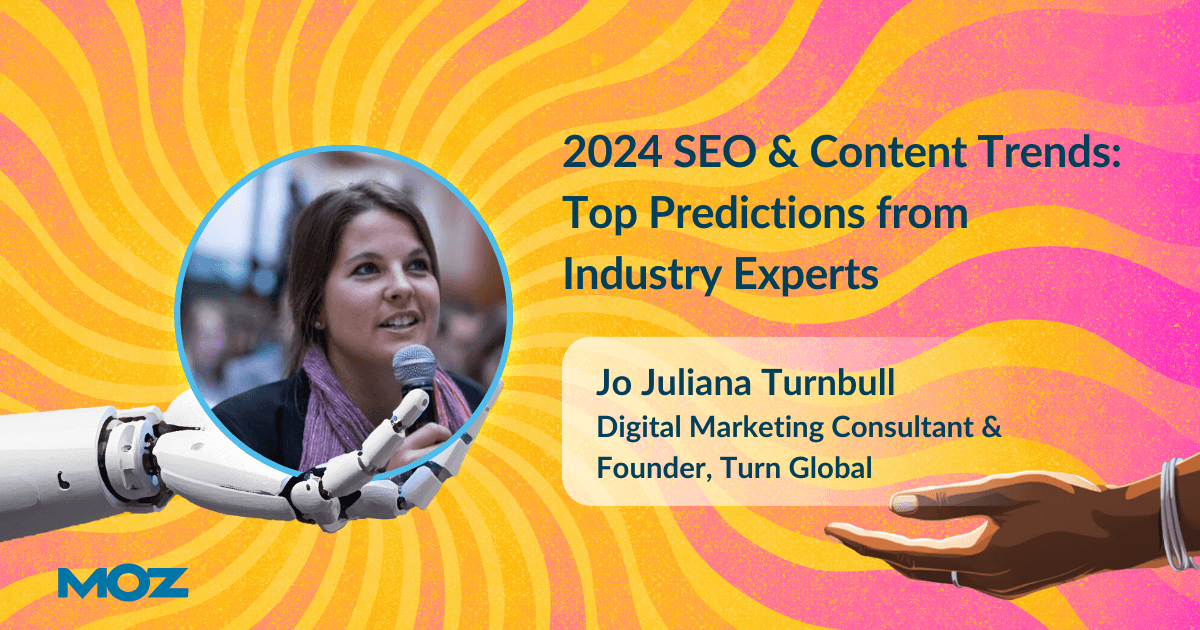
Jo Juliana Turnbull — Digital Marketing Consultant & Founder at Turn Global
In 2024, I expect to see an accelerated pace of Google updates, similar to what we experienced in the last quarter of 2023. We may also see Schema markup becoming less emphasized, except for local businesses.
E-E-A-T will grow in importance across all sectors, not just Your Money or Your Life (YMYL) industries. Therefore, subject matter expertise is essential for website credibility, and those lacking it face a competitive disadvantage.
Also, I predict that video SEO will become a critical part of marketing strategies, and companies that do not incorporate video may miss significant opportunities. Additionally, AI tools like ChatGPT will become integral components of marketing strategies, even on a small scale.
Lastly, Google Analytics 4 (GA4) will continue to evolve, requiring marketers to stay adaptable. Looker Studio may also change, further shaping our data analysis and SEO strategy approach.
AI in SEO and content predictions
19. Diversifying SEO with advanced AI and multiplatform strategies
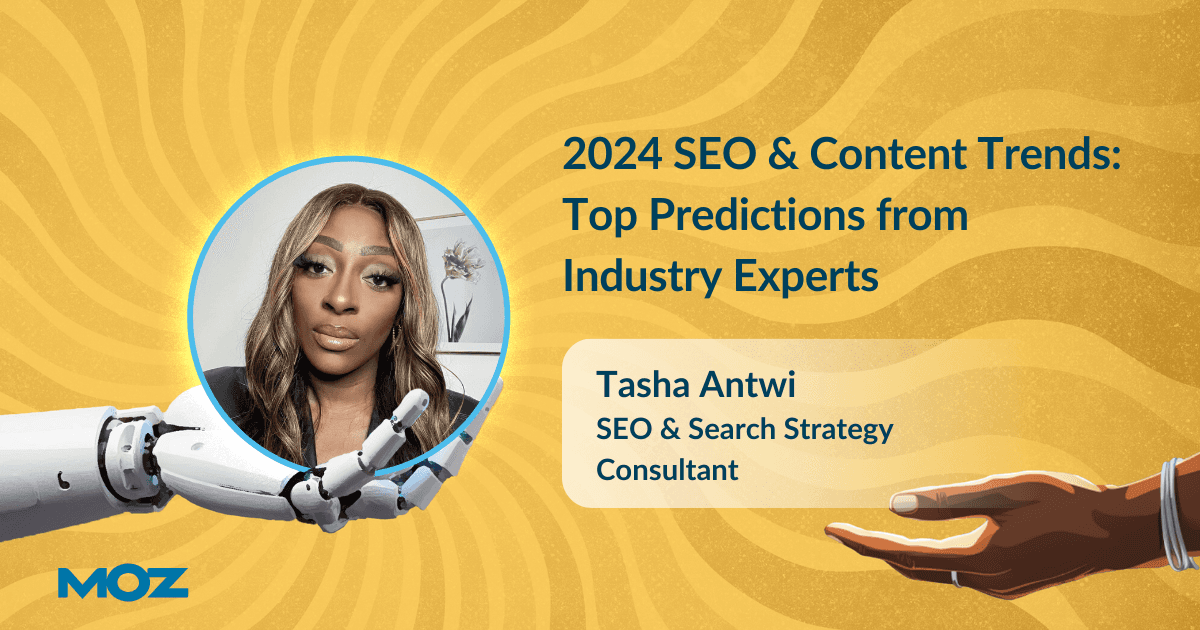
Tasha Antwi — SEO & Search Strategy Consultant
As we move forward, the integration of AI in SEO is set to become more advanced. This advancement will help in understanding user intent, streamlining content creation, and delivering more personalized search experiences. I predict that Google's search algorithms and generative AI will prioritize content from different voices (Google perspectives).
Therefore, optimization must be driven by an in-depth understanding of your audience for semantic search, influencing content types and formats in Google’s SERPs.
Adopting a multiplatform search strategy is essential. Google will no longer be first in a user's search journey. Platforms like TikTok are reshaping search demand on Google and trending topics on YouTube. In this landscape, your website acts as a central, albeit less visible, powerhouse (like a car engine), supporting your digital presence across various touchpoints (akin to the car's body).
To effectively guide users, it's essential to comprehend how they search on each platform and understand their role in the user journey. This insight will enable you to tailor search strategies across different platforms and touchpoints.
20. The rise of emotional intelligence in content
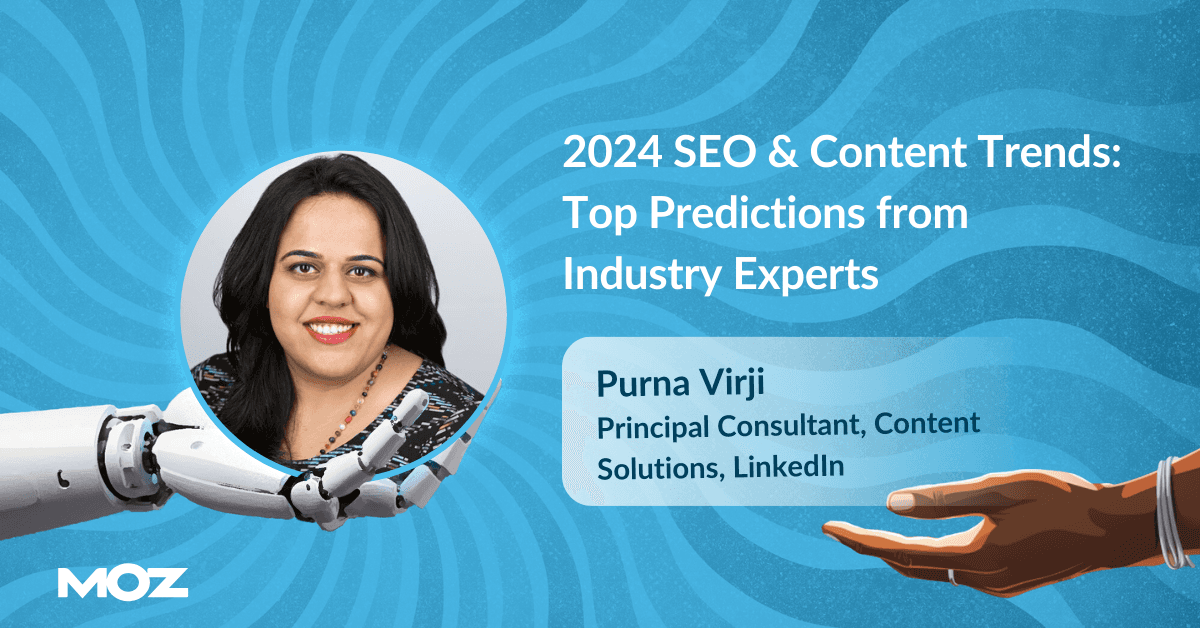
Purna Virji — Principal Consultant, Content Solutions at LinkedIn
With the AI hype of 2023, I believe the pendulum will start swinging the other way to focus on EI (Emotional Intelligence). Marketers using AI only to pump out mediocre content to game algorithms are unlikely to go far. Instead, the marketers who’ll thrive are those who use AI’s powers to build higher-impact content that meets people’s evolving wants and expectations.
But prepare for things to get worse before they get better – even the internet had to go through the dot-com bubble bursting before it became what it is today.
AI is all about making us more effective. Yet, what makes us human will always be in demand. When the barriers to entry are lowered, and everyone uses the same tools in similar ways, it takes being human to stand out. Thus, a big trend in content will be focusing on understanding customer needs, thought leadership content to build trust, and an increased focus on educational content designed to empower audiences.
21. Expect tailored strategies and dynamic experiences amidst AI innovation

Thierry Ngutegure, Head of Data Insight at SALT
As AI shifts from its experimental stages to more widespread implementation in search, embracing constant change becomes essential. This evolution demands agile learning and adaptation, a necessity for smaller entities and industry giants like Google. The key to success lies in a cycle of testing, tweaking, and repeating.
This AI-driven approach moves us from generic strategies to tailored ones that cater to individual preferences and needs.
Take the travel industry as an example; the traditional personalization approach based on static personas is replaced by dynamic, bespoke experiences that influence travel decisions. Imagine offering customized travel recommendations encompassing safety, weather conditions, dietary needs, accessibility options, and budget considerations.
Amidst all this innovation, it's crucial to maintain ethical standards and prioritize privacy. Responsible AI use and data handling are fundamental to building trust and credibility.
22. Authentic brands might lose traffic to AI-generated content
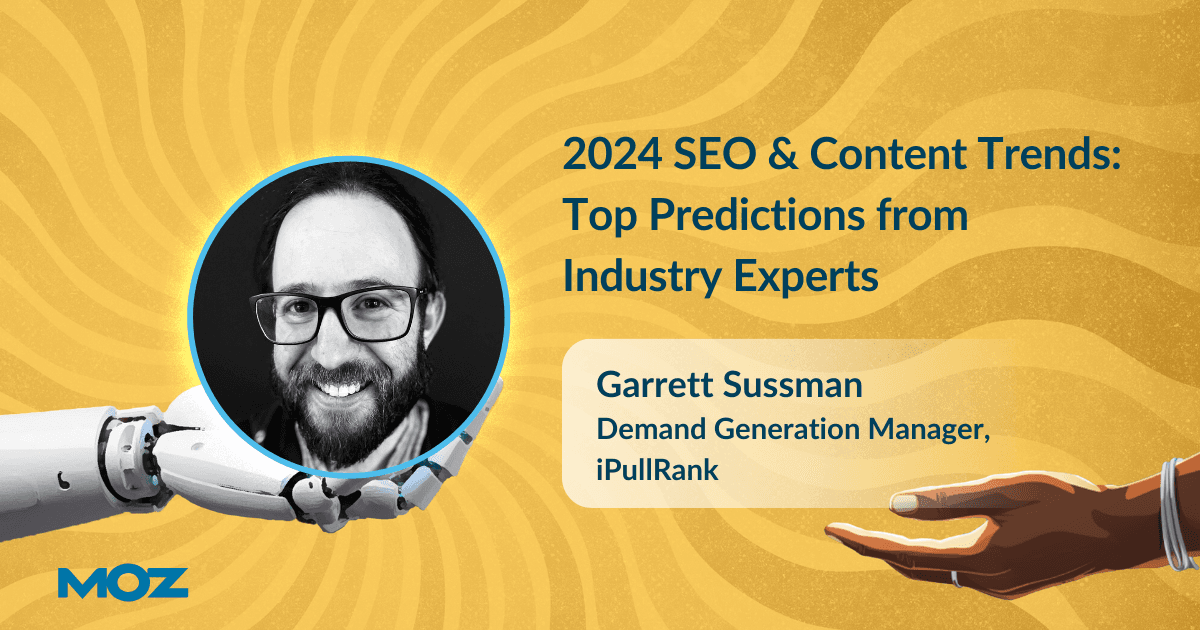
Garrett Sussman — Demand Generation Manager at iPullRank
As Google adjusts to the influx of AI-generated content, we might witness a surprising trend: authentic brands losing organic traffic despite their best efforts. This phase could set a precedent by penalizing a major brand for ranking well outside its area of expertise. However, this won’t significantly alter the content strategies of most large enterprises, who are likely to stick to their established approaches.
Also, the issue of 'copycat' content will persist, as the current system may continue to reward such content inadvertently. Interestingly, despite maintaining its market dominance, Google's advertising revenue is projected to decline.
I predict that search results will become increasingly personalized and context-specific, but this won't stop the ongoing debate about the quality of Google's search results. Despite these developments, one thing remains clear: SEO is not dead.
23. Search engines will lean on AI and machine learning for deeper audience insight

Fabio Embaló — Co-Founder & CEO at Viaduct Generation
In 2024, SEO will be heavily influenced by AI and machine learning. Search engines will lean on these technologies for more refined algorithms and a deeper understanding of user intent. Content creation should center around user inquiries, incorporating clear language, relevant keywords, and aligning with semantic search trends.
User Experience (UX) will also play a pivotal role as a ranking factor. Prioritize mobile optimization, fast loading times, and intuitive navigation to enhance UX. Additionally, the importance of video content can't be overstated, particularly on platforms like Instagram Reels and TikTok. Create engaging and informative videos, ensuring well-optimized titles, descriptions, and transcriptions.
24. More than half of the content on the web will be AI-generated by the end of 2024

Roxana Stingu — Head of Search & SEO at Alamy
By the end of 2024, more than half of the web’s content will be AI-generated. This influx of AI content will prompt search engines to reassess the importance they place on content as a ranking signal, turning their attention to other factors.
Hence, websites with strong, trusted brand signals are poised to maintain dominance, particularly for commercial queries.
Also, the role of backlinks might be resurgent, potentially gaining more weight than they currently hold. Websites with trusted brand signals will continue to dominate and even be preferred for most commercial queries.
In response to these changes, we can anticipate a more stringent version of Google's Penguin algorithm to regulate the quality and relevance of backlinks — whether or not Google announces this update.
25. Navigate Google's AI content filters with diverse content formats
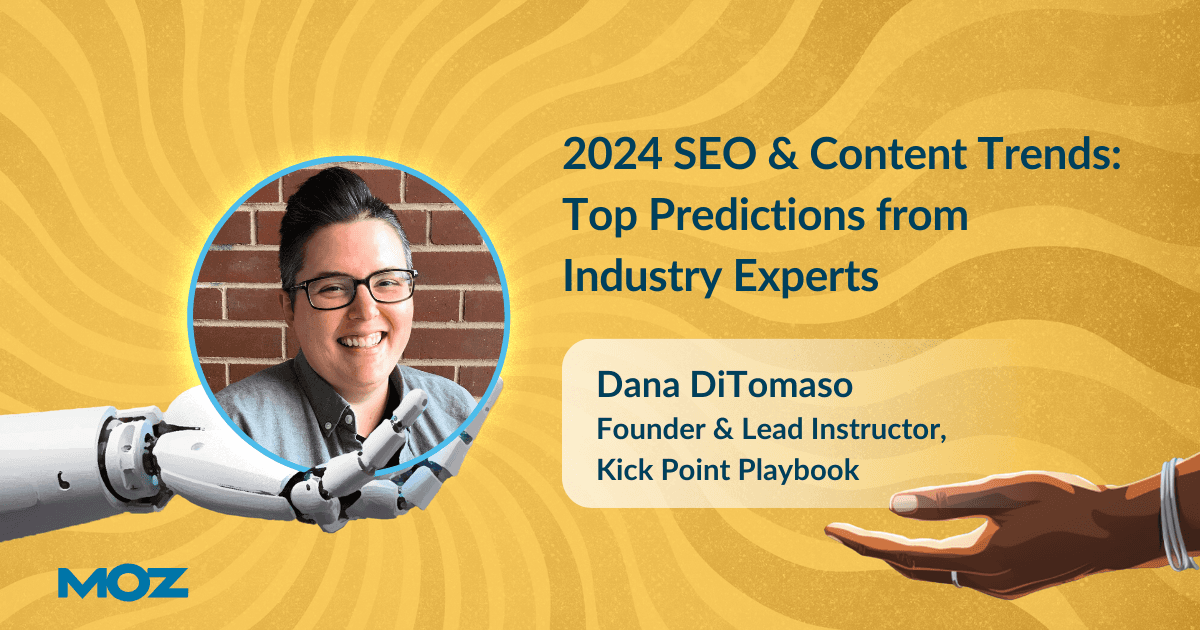
Dana DiTomaso — Founder & Lead Instructor at Kick Point Playbook
Like many experts in this roundup, I believe AI will be a central theme in 2024. I predict that Google will increase its efforts to filter out low-quality AI-generated content. Will this result in accidental penalties for websites without any AI content? Of course.
To avoid this, make sure you are following the principles of E-E-A-T. Additionally, diversify the way you present content on your site. For example, offering a video version of your blog post caters to different user preferences and aligns with the evolving features in search results.
26. AI will force content marketers and SEOs to level up
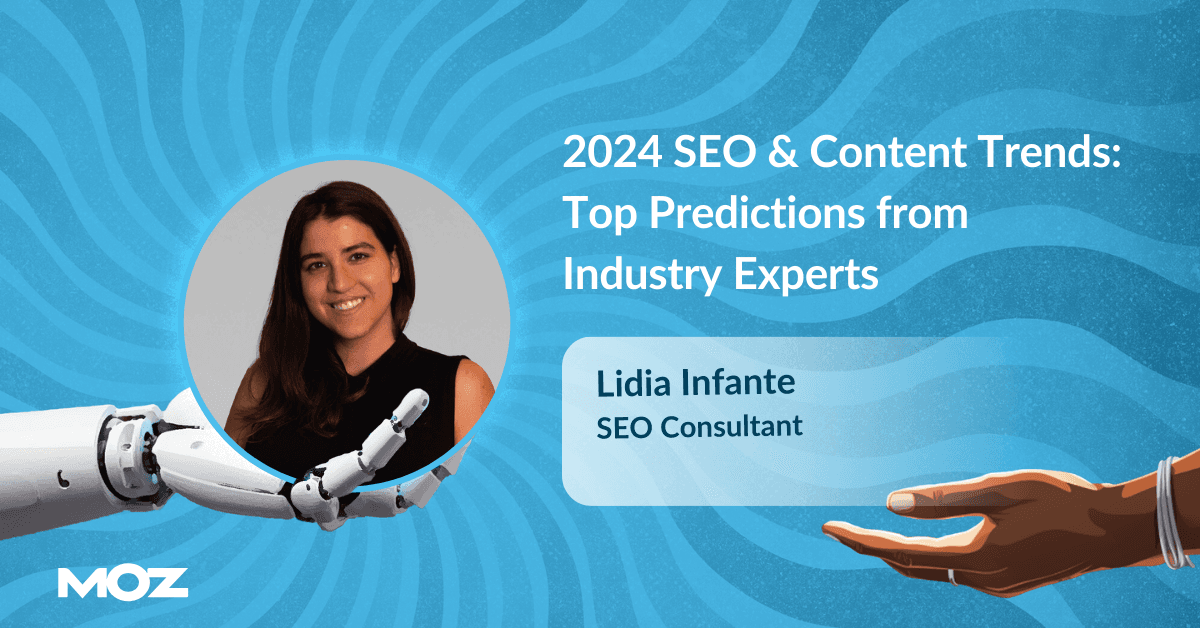
Lidia Infante — SEO Consultant
I believe that the AI disruption will force content marketers and SEOs to level up if they want to keep their jobs. The key to success will be combining a deep knowledge of your audience, highlighting author expertise, and enriching your content with Schema, all assisted by AI tools.
This is not about creating content or chasing search volume but understanding what content drives business goals forward and enriching it with author expertise and Schema markup.
More content from Lidia Infante
Sustainable SEO
27. Sustainability and ethics will drive SEO content strategy

Rejoice Ojiaku — SEO Manager
The emphasis on sustainability, social responsibility, and ethical practices in SEO content will be paramount in 2024. Consumers are progressively aligning their purchasing decisions with their values, making it crucial for brands to integrate these themes into their content strategies.
To optimize for this trend:
Incorporate sustainability-related keywords naturally into your content.
Share real stories about your brand's sustainable practices and social initiatives.
Create informative content that educates your audience about sustainability and ethical practices to position your brand as a thought leader in this space.
Encourage user interaction by creating content that invites feedback and discussion on sustainability topics.
More content from Rejoice Ojiaku
Map Your Keywords to the Buyer’s Journey and User Intent — Whiteboard Friday








